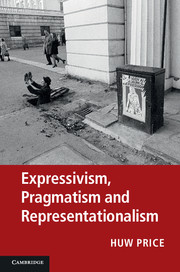Book contents
- Frontmatter
- Dedication
- Contents
- Notes on contributors
- Preface
- PART I THE DESCARTES LECTURES 2008
- PART II COMMENTARIES
- 4 Pragmatism: all or some?
- 5 Global anti-representationalism?
- 6 Naturalism, deflationism and the relative priority of language and metaphysics
- 7 How pragmatists can be local expressivists
- PART III POSTSCRIPT AND REPLIES
- Bibliography
- Index
5 - Global anti-representationalism?
Published online by Cambridge University Press: 05 July 2013
- Frontmatter
- Dedication
- Contents
- Notes on contributors
- Preface
- PART I THE DESCARTES LECTURES 2008
- PART II COMMENTARIES
- 4 Pragmatism: all or some?
- 5 Global anti-representationalism?
- 6 Naturalism, deflationism and the relative priority of language and metaphysics
- 7 How pragmatists can be local expressivists
- PART III POSTSCRIPT AND REPLIES
- Bibliography
- Index
Summary
REPRESENTATIONAL SEMANTICS AND EXPRESSIVIST PRAGMATICS
Huw Price is one of the boldest and most original voices of pragmatism in the generation after Richard Rorty and Hilary Putnam. Two particularly interesting ideas he has been developing recently are subject naturalism and global expressivism.
The term by contrast to which ‘subject naturalism’ is defined is ‘object naturalism’, which is the kind usually associated with the term ‘naturalism’. It aspires to a particular kind of semantic account of some vocabulary or discursive practice. More particularly, it offers a representational account. That is, it says what objects and properties that vocabulary talks about, what range of facts it states or expresses. That representational semantic strategy accounts for the ‘object’ side of object naturalism. The ‘naturalism’ side is a matter of the semantic metavocabulary that is employed, in part to specify the ontology: what kinds of things the vocabulary in question represents. It is to be a naturalistic vocabulary. That is a genus that comprises a variety of species, including at least the vocabulary of fundamental physics, vocabularies of the special natural sciences, or, least demandingly, groundlevel empirical descriptive vocabulary, including both observational and theoretical vocabulary.
By contrast, subject naturalism is the project of using a vocabulary that is naturalistic in one of these senses, not as a semantic metavocabulary but as what in Between Saying and Doing (Brandom 2008) I call a ‘pragmatic metavocabulary’.
- Type
- Chapter
- Information
- Expressivism, Pragmatism and Representationalism , pp. 85 - 111Publisher: Cambridge University PressPrint publication year: 2013
- 22
- Cited by



